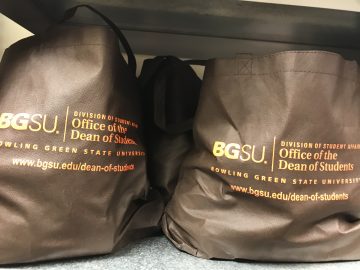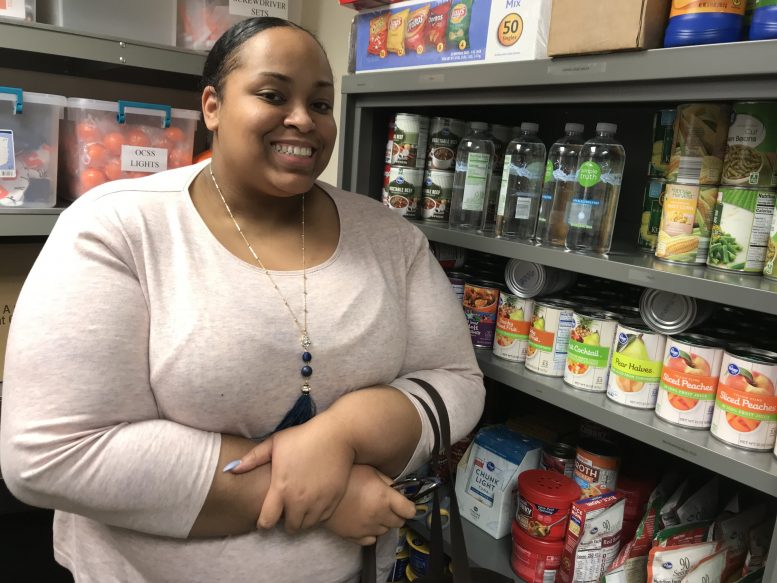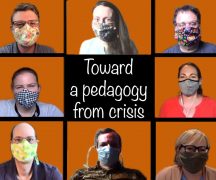By DAVID DUPONT
BG Independent News
Last summer Danielle Haynes, who was new to her job as coordinator of student case management at Bowling Green State University, started hearing from students who didn’t have enough to eat.
So she fed them. She had a basket in her office. At first it was filled with food she brought from home. “Then I went to grocery store a few times and bought them things with my own money.” She had a basket of groceries they could help themselves to.
Chris Bullins, the assistant dean of students, noticed. Haynes recalls Bullins asking her: “Are you buying groceries for students?”

Bullins was able to get her $200, and Grab and Go was off and running. She now maintains a small pantry in a walk in closet filled with bags that contain cereal, oatmeal, rice, tuna, canned vegetables, canned fruit, instant macaroni and cheese, chips, peanut butter, ravioli, and a small bag filled with toiletry items. It’s enough for three days of breakfast lunch, and dinner as well as snacks.
She said that summer proved a challenging time. Students were on campus to take courses, but the dining halls were closed.
But the need extends beyond summer.
With shorter semesters, she said, some students who buy the basic Bronze meal plan are finding themselves coming up short because they need to stay on campus more.
Often students who are the first in their families to attend college don’t have resources back home to fall back on. And more foster children, who are without family connections, are now attending BGSU.
Haynes’ project is the latest effort aimed at making sure students have enough to eat.
Falcon Care program started about five years ago.
Mike Paulus, campus dining director with Chartwells, said he was approached by a student senator wanting to pursue opening a food pantry on campus.
“I’ve never seen a food pantry on campus effectively operate,” Paulus said. The pantries have a hard time keeping enough student volunteers to staff them.
But he knew there was a need. He had a student employee who was living in his car. “A food pantry wouldn’t help him.”
What Paulus helped launched was Falcon Care, which provides dining cards good for five meals. The cards are generic and can’t be identfied.
Chartwells supplies the first 10 cards. Then students are encouraged to donate meal swipes at Oaks and Carillon Place.
But not everyone eats in those facilities, Haynes said.
So she’s reaching out to the Greek community to donate swipes. She’ll attend their meetings and have the paperwork with her.
Students apply for the cards through the dean of students office. Since Haynes arrived in April she’s given out 17 Falcon Care cards.
This is all part of an increased focus on the issue of food security, which Sandra Earle, wife of President Rodney Rogers, has taken on as a cause.
“I want students to have everything they need to be successful,” she told BG Independent News last fall. “I don’t want them worrying about what they’re going to eat. … You need to be nourished to do well in college.”
The Center for Community and Civic Engagement launched BGSU Ending Hunger to focus on the issue about two years ago.
There’s a mobile food pantry that visits campus monthly during the fall and spring semester.
The pantry’s first visit of the year was today. The next will be March 26, 2-4 p.m. in Lot N on the north side of Jerome Library.
That mobile food pantry is open to anyone in need whether undergraduates, graduate students, staff, or community members.
Last fall, Emily Kollar, civic action leader for BGSU Ending Hunger, said that the pantry was drawing a broad cross-section of people, about 50-80 a month.
The effort also tries to connect people with local food pantries — St. Mark’s Lutheran, First University Methodist, the Bowling Green Christian Food Pantry, and the Brown Bag Food Project — that help students. Some of these also hold community meals.
Those efforts include a community garden that was planted east of the School of Art. Though it was planted late in the season last summer, it produced an abundance of produce including tomatoes and herbs, said Paige Wieman, campus dietician.
She hopes more can be planted throughout campus. These gardens as well are open to anyone who wants to harvest as well as help with weeding and other chores.
Kollar said two years ago a campus survey was done to see what the need was. The survey found a lot of students are willing to miss class or miss review sections to go to work. That was hurting their grades.
About two-thirds of students have jobs, and that’s factoring in freshmen who are less likely to work. Of those who work, about a quarter are working more than 20 hours, sometimes more than 30 hours a week.
Of the random sample of students, 41 percent recorded having some level of food insecurity, she said.
That may mean having to skip class to work to buy food, Wieman said. It may mean skipping a meal.
If someone has children, it may mean missing a meal so the kids have food.
Kollar said the results of the survey were “more alarming than surprising.”
“It’s subject not often talked about so we figured (the need) was larger than we assumed,” Wieman said.
The survey will be repeated again this spring.
The university’s population extends beyond the traditional student who arrives fresh from high school graduation.
Now there are more post-traditional students in their 30s and 40s, who may have children in tow. There are military veterans. There may be international students with dependents navigating a new culture.
“We need to do more to help these students and community members,” Wieman said.
Haynes has expanded what she provides students. She’s been able to give out vouchers to the LMarie’s laundromat and vouchers for the Fringe Thrift Shop in Woodland Mall, where all adult items are $1 and kids items are 50 cents.
“Single parents are very grateful for those services,” she said.
She also has extra long sheets, blankets, and pillows to help students in need get settled.
The biggest hurdle to getting help to those who need it may be pride. There’s a stigma attached to food insecurity, Haynes said.
Kollar said: “You shouldn’t ashamed for going for asking for help.”





